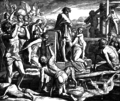Portal:Cities
The Cities Portal

A city is a human settlement of a substantial size. The term "city" has different meanings around the world and in some places the settlement can be very small. Even where the term is limited to larger settlements, there is no universally agreed definition of the lower boundary for their size. In a narrower sense, a city can be defined as a permanent and densely populated place with administratively defined boundaries whose members work primarily on non-agricultural tasks. Cities generally have extensive systems for housing, transportation, sanitation, utilities, land use, production of goods, and communication. Their density facilitates interaction between people, government organizations, and businesses, sometimes benefiting different parties in the process, such as improving the efficiency of goods and service distribution.
Historically, city dwellers have been a small proportion of humanity overall, but following two centuries of unprecedented and rapid urbanization, more than half of the world population now lives in cities, which has had profound consequences for global sustainability. Present-day cities usually form the core of larger metropolitan areas and urban areas—creating numerous commuters traveling toward city centres for employment, entertainment, and education. However, in a world of intensifying globalization, all cities are to varying degrees also connected globally beyond these regions. This increased influence means that cities also have significant influences on global issues, such as sustainable development, climate change, and global health. Because of these major influences on global issues, the international community has prioritized investment in sustainable cities through Sustainable Development Goal 11. Due to the efficiency of transportation and the smaller land consumption, dense cities hold the potential to have a smaller ecological footprint per inhabitant than more sparsely populated areas. Therefore, compact cities are often referred to as a crucial element in fighting climate change. However, this concentration can also have some significant harmful effects, such as forming urban heat islands, concentrating pollution, and stressing water supplies and other resources. (Full article...)
Selected city -
Luanda (/luˈændə/ also /-ˈɑːn-/ Portuguese: [luˈɐ̃dɐ]) is the capital and largest city of Angola. It is Angola's primary port, and its major industrial, cultural and urban centre. Located on Angola's northern Atlantic coast, Luanda is Angola's administrative centre, its chief seaport, and also the capital of the Luanda Province. Luanda and its metropolitan area is the most populous Portuguese-speaking capital city in the world and the most populous Lusophone city outside Brazil. In 2020 the population reached more than 8.3 million inhabitants (a third of Angola's population).
Among the oldest colonial cities of Africa, Luanda was founded in January 1576 as São Paulo da Assunção de Loanda by Portuguese explorer Paulo Dias de Novais, being occasionally called "Leonda" or "St Paul de Leonda" by non-Portuguese sources. The city served as the centre of the slave trade to Brazil before the institution was prohibited. (Full article...)
Did you know -
- ... that one critic likened the design of 185 Montague Street in New York City to the horns of Count Basie's orchestra?
- ... that the men's winner of the 2022 New York City Marathon was almost hit by a vehicle during the race?
- ... that a former radio host got a free apartment in New York City's King Manor and lived there for more than three decades?
- ... that when the New York City Subway's 14th Street–Union Square station was built, the park above it was raised?
- ... that the New York City Police Department shut down highway and bridge traffic for the funeral of the owner of Neary's, an Irish pub?
- ... that Ernest Hemingway broke a cane over John O'Hara's head in Costello's, an Irish bar in New York City?
Related portals
Related WikiProjects

Enugu (Igbo: Ọ̀hà Enugu) verbally pronounced as "Enụgwụ" by the Igbo indigenes is a state in the South-East geopolitical zone of Nigeria, bordered to the north by the states of Benue and Kogi, Ebonyi State to the east and southeast, Abia State to the south, and Anambra State to the west. The state takes its name from its capital and largest city, Enugu. The city acquired township status in 1917 and was called Enugwu-Ngwo. Due to the rapid expansion towards areas owned by other indigenous communities, it was renamed Enugu in 1928.
Of the 36 states, Enugu is the 29th largest in area and 22nd most populous with an estimated population of over 4.4 million as of 2016. Geographically, the state is divided between the Niger Delta swamp forests in the far south and the drier Guinean forest–savanna mosaic with some savanna in the rest of the state. Other important geographical features are the Udi-Nsukka Plateau and Ekulu River, which flows through the city of Enugu. (Full article...)
Selected article -

The term was originally used for the Venetian Ghetto in Venice, Italy, as early as 1516, to describe the part of the city where Jewish people were restricted to live and thus segregated from other people. However, other early societies may have formed their own versions of the same structure; words resembling ghetto in meaning appear in Hebrew, Yiddish, Italian, Germanic, Polish, Corsican, Old French, and Latin. During the Holocaust, more than 1,000 Nazi ghettos were established to hold the Jewish populations of Europe, with the goal of exploiting and killing European Jews as part of the Final Solution of Nazi Germany. (Full article...)
General images -
Topics
List articles
Subcategories
Associated Wikimedia
The following Wikimedia Foundation sister projects provide more on this subject:
-
 Commons
Commons
Free media repository -
 Wikibooks
Wikibooks
Free textbooks and manuals -
 Wikidata
Wikidata
Free knowledge base -
 Wikinews
Wikinews
Free-content news -
 Wikiquote
Wikiquote
Collection of quotations -
 Wikisource
Wikisource
Free-content library -
 Wikiversity
Wikiversity
Free learning tools -
 Wiktionary
Wiktionary
Dictionary and thesaurus
-

-

-

-

-
Random portal




























